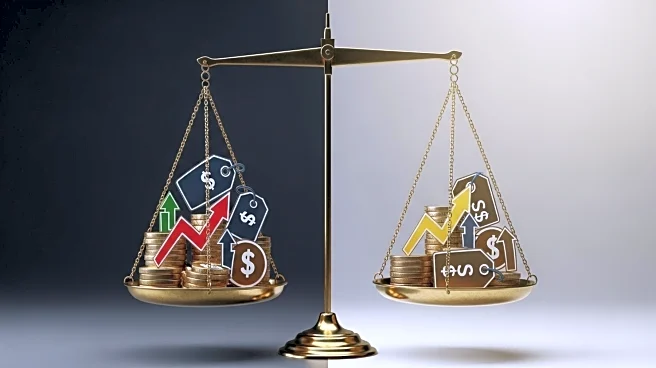What's Happening?
The U.S. is experiencing a growing economic divide exacerbated by rising inflation and tariffs. According to a report from the Yale Budget Lab, core goods prices have increased by 1.9% above pre-2025 trends, largely due to tariffs on imports. This has led to higher prices for essential items such as window coverings, appliances, and electronics. The Boston Federal Reserve has also reported that low and middle-income consumers are facing increased credit card debt compared to pre-pandemic levels. While wealthier Americans continue to support the consumer economy, those with less financial security are feeling the strain. Individuals like Yanique Clarke, a lower-income nursing student, report significant price hikes in groceries and clothing, aligning with Labor Department data showing increased prices for tariff-exposed products. Economists suggest that the Trump administration's immigration policies may also be contributing to rising food prices by affecting labor costs in the agriculture sector.
Why It's Important?
The economic divide highlighted by rising prices and tariffs has significant implications for U.S. society and the economy. Lower-income households, which spend a larger portion of their budget on imports, are disproportionately affected by tariffs. This situation creates a 'two-tier economy,' where wealthier individuals can maintain their spending habits while others struggle. The impact on consumer behavior is evident, with more people engaging in price comparisons and seeking value options. This shift could influence retail strategies, as seen with McDonald's expanding its value menu to attract price-conscious customers. The broader economic implications include potential changes in consumer spending patterns, which could affect overall economic growth and stability.
What's Next?
As tariffs continue to impact prices, businesses and consumers may need to adapt further. Retailers might increase their focus on value offerings to cater to budget-conscious shoppers. Policymakers could face pressure to address the economic divide and consider measures to alleviate the burden on lower-income households. The ongoing debate about the long-term effects of tariffs on inflation and the economy is likely to continue, with potential implications for future trade policies and economic strategies.
Beyond the Headlines
The current economic situation raises ethical and social questions about income inequality and access to essential goods. The impact of tariffs on lower-priced imports highlights the vulnerability of certain economic groups and the need for policies that address these disparities. Additionally, the role of immigration policies in labor market dynamics and their effect on prices could become a focal point for discussions on economic and social policy.










